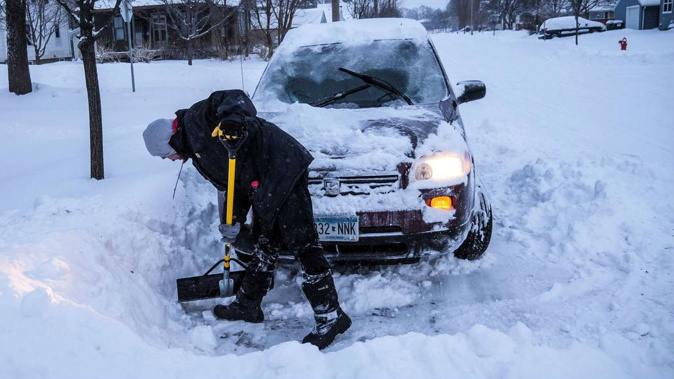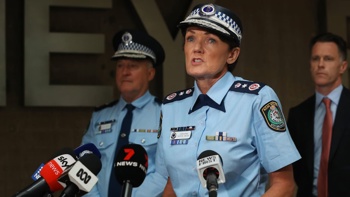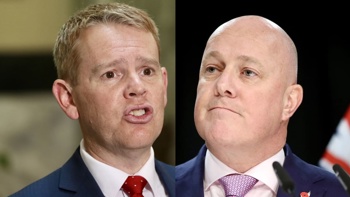
All-time records are in jeopardy this week as the coldest air in a generation descends from the Arctic into the Lower 48.
Nearly 90 million people will experience temperatures at or below zero degrees this week from the Midwest to New England, according to the National Weather Service, and 25 million of those will face temperatures below minus-20 Fahrenheit (-28 degrees Celsius).
Wind chill temperatures plummeted to minus-50 in the Dakotas and northern Minnesota Tuesday morning (US time), and that same, painfully frigid air is forecast to spread southeast into Minneapolis, Milwaukee, Chicago and Detroit.
The wind chill will plunge to minus-30 to minus-40 as far south as Illinois and northern Indiana. The wind chill temperature, which is a measure of what the air fees like when wind is taken into account, will fall as low as minus-65 in the Upper Midwest.
/arc-anglerfish-syd-prod-nzme.s3.amazonaws.com/public/6BLT3EIX6ZEXJLZLGJAS3EQACU.jpg)
As a winter storm system moves through the upper Midwest, snow plows clear snow from the westbound lanes of US Highway 12/18 in Madison, Wisconsin. Photo / AP
While actual temperatures drop to negative double digits this week, media have been clamouring to find exotic locations that will be warmer than the Midwest. Antarctica, for example, will be a balmy 10 degrees Thursday morning when Minneapolis drops to around minus-30. But it is summertime in the Antarctic, so that shouldn't be surprising.
What is surprising, at least meteorologically, is the Midwest will be colder than the North Slope of Alaska Thursday morning. Utqiagvik, formerly known as Barrow, will drop to around minus-20 — 10 degrees warmer than parts of Minnesota, Wisconsin and Illinois will be at the same time.
The Arctic cold is all but certain to break records, but could be truly historic in Illinois. Chicago's forecast low temperature Thursday morning is within the margin of error of its lowest on record, minus-27 set on Jan. 20, 1985.
The National Weather Service is going with minus-24 at sunrise Thursday, which would fall short. But one forecast model that has been running particularly cold this week, the European, predicts Chicago's will drop to minus-29 Thursday morning.
Even the state record in Illinois is in jeopardy — minus-36 degrees set in Congerville on January 5, 1999. Conditions are particularly favorable for state records to fall this week, with clear skies and fresh snow on the ground.
The cold air is riding behind an Arctic front that brought several inches of snow to the same region over the weekend. The pure white ground will enhance the chill, as sunlight reflects off the snow and back to space instead of being absorbed into the ground where it could warm things up.
If those conditions line up, they could "easily push" temperatures to minus-35 to minus-39 in Northern Illinois, the National Weather Service said Tuesday, which would jeopardise if not topple the state's coldest low.
/arc-anglerfish-syd-prod-nzme.s3.amazonaws.com/public/6247ZKFL35DJTGJCQXOZQCZNJE.jpg)
Bill Moore cross-country skis down a street in Montpelier, Vermont. Photo / AP
Even if all-time records are not broken, the National Weather Service in Chicago is calling this week's forecast "life-threatening extreme cold" that "can lead to rapid onset of frostbite and hypothermia."
A recent report from the Centers for Disease Control and Prevention found that cold weather is responsible for the majority of weather-related fatalities.
The wind chill temperature is more than a catchy forecast term. The wind blows away the insulating layer of warm air around us generated naturally by our bodies.
Wind chill attempts to quantify the effect in terms of how it feels on our skin, which is why you'll sometimes hear it called the "feels like" temperature. A wind chill of minus-20 degrees can cause frostbite in as little as 30 minutes.
Dozens of records could be broken this week as the temperatures fall. Forecast suggest Wednesday's high temperatures in the Midwest might be some of the coldest on record for certain locations, and Thursday morning's low temperatures could also set new records.
Take your Radio, Podcasts and Music with you









